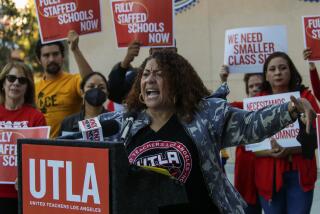Former Allies Vie for Top Job at the AFL-CIO : Labor: Thomas R. Donahue and John J. Sweeney emphasize organizing to attract new union membership.
- Share via
Perhaps the toughest task for the two opponents in the first-ever contested election for president of the AFL-CIO is finding areas where they disagree.
The candidates--Thomas R. Donahue, interim AFL-CIO president, and John J. Sweeney, president of the Service Employees International Union--squared off in Los Angeles on Thursday in the first debate of their campaign. Sweeney, 61, portrayed himself as a risk taker who will push reforms through quickly. Donahue, 66, argued that he has already begun to implement programs similar to those Sweeney advocates.
Both are longtime friends and collaborators who split publicly only after Lane Kirkland in June announced his retirement as head of the nation’s largest labor federation.
The mere fact that there would be a race to succeed Kirkland, after 40 years of elections by acclamation, has drawn new attention to the 14-million-member AFL-CIO and the labor movement in general, and both candidates are determined to keep the spotlight there as long as possible.
Sweeney headed a dissident group of AFL-CIO members that, dissatisfied with years of lethargy within the umbrella organization, forced Kirkland’s resignation. Although Donahue served 16 years as Kirkland’s No. 2, he tried to persuade Kirkland not to seek another term.
The forum was part of a two-day political action conference sponsored by the California Labor Federation. The two-hour debate and question-and-answer session drew more than 200 labor delegates to a ballroom at the Biltmore Hotel.
The Oct. 26 election, at the AFL-CIO’s annual convention, will determine who will become the leading national voice of labor at a time when, in Sweeney’s words, employers speak in Congress with a “mighty roar” while “the voices of workers and their families are but a whisper.”
Union membership has declined from nearly 25% of the U.S. work force in 1980 to 15.5% today, and both Sweeney and Donahue outlined their plans to reverse that trend through more aggressive workplace organization.
Sweeney’s SEIU has nearly doubled its membership to 1.1 million during his 15 years at the helm, partly through consolidation with other unions and partly through such high-profile efforts as the bare-knuckles “Justice for Janitors” campaign to organize janitors in high-rise office buildings.
Impatient with what he called “the pattern of gradualism that is ingrained in the AFL-CIO,” Sweeney has vowed to devote a third of the federation’s annual budget to organizing, including creating a $20-million emergency budget for short-term projects.
He called for an increase in the number of seats on the federation’s executive body to make room for more women and minorities, the creation of a strategic fund for unions in “life or death” battles, and the establishment of a computer database to help unions use the economic weight of their pension funds to pressure corporations in various ways.
Donahue was elected interim president when Kirkland’s resignation took effect Aug. 1.
Whatever baggage he carries as Kirkland’s longtime understudy he tried to unload Thursday by noting that Sweeney, before declaring his own candidacy, tried to talk Donahue into running.
“I’m John’s handpicked candidate,” he said.
Donahue also wants the federation to take a more active role in organizing, and he noted that he helped create the AFL-CIO Organizing Institute to recruit and train organizers. He called for a doubling of the institute’s annual graduating class next year, with more increases to follow.
But Donahue criticized Sweeney for not identifying where he would cut the AFL-CIO’s annual budget if he intends to shift more funds into organizing.
Sweeney claims the support of unions representing 60% of the AFL-CIO’s membership, including the United Auto Workers and the International Brotherhood of Teamsters.
Donahue’s backers say he has the support of more AFL-CIO-affiliated unions but that they tend to be smaller unions. The American Federation of Teachers and the United Food and Commercial Workers are in Donahue’s camp, according to spokeswoman Candice Johnson. If he is to overcome Sweeney’s apparent lead, Donahue will have to count on splitting or turning around the vote of some unions that have already declared for Sweeney.
More to Read
Get the L.A. Times Politics newsletter
Deeply reported insights into legislation, politics and policy from Sacramento, Washington and beyond. In your inbox twice per week.
You may occasionally receive promotional content from the Los Angeles Times.










